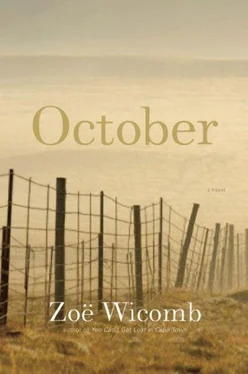Certain aspects of the bourgeois I won’t deny, she admitted. Social and economic security is after all of value because it brings tolerance of the other, which can only be a good thing.
But which, Jake said triumphantly, you have just shown to not be the case. You are your father’s child, and Sylvie belongs to those other people who can’t be tolerated.
Jake was right, she conceded, and her view of the girl was inexcusable, so that she would make every effort to get to know Sylvie and rise above her prejudices. She put her arms around him and said that she hoped he’d be a good husband and keep off the drink.
So once again Mercia falls short of her promise, knows that she cannot delete the word, tart. But it is not only the pictures of Sylvie that interest her. There is for her nostalgic recognition of the Willemse house, the whitewashed raw brick and its patch of veld fenced off with chicken wire that serves as a garden. Culture sliding into rude nature, for whilst the vygies have been planted, arranged in the enclosure, they are barely different from the flora beyond the fence. And around the so-called garden, in stiff competition, is the less garish, yellow sea of common gousblom that has drifted from the roadside. But it is quite eclipsed by the two patches of vygie in fluorescent purple that anchor Sylvie’s provocative figure.
As a teenager, Mercia found that house fascinating. It was the only one that had, if not a stoep as such, something of a verandah, a rough assortment of corrugated strips balanced on stilts, that threw its shadow on the broom marks of the patch where old women sat in the afternoons. Then it was by no means a garden since the enclosure, so much larger in those days, also held two hens and a bantam cockerel with a plume of glossy blue and green tail feathers, who strutted the perimeter, pecking his way, up and down, up and down, amidst what she remembers as straggly lucerne. Was there not an outlandish plaster gnome with a painted red hat that she admired from the distance?
Mercia remembers the old women, two of them she thinks, and the child, Sylvie, who lived in the wobbly-walled whitewashed house with gingham curtains. No hollyhocks, of course, but on the stoep with its makeshift verandah there was a painted paraffin tin with something growing — was it a vygie? or a malva? — something that may or may not have flowered. There was certainly the little girl, Sylvie, barely a toddler, who skipped about chatting and singing to herself, her head like that of the cockerel bobbing this way and that. Her bonnet tied under her chin hung by its slack straps on her back. As a child, Mercia had not dared take off her own bonnet with its stitched, starched brim framing her face to keep the sun out, and the pleated flap at the back for protecting her neck. Her mother had sewn a pretty picot edging all around the bonnet, so that there was no question of not being grateful, but how she admired the child who had tossed the thing off her head, in spite of an aproned Willemse auntie scolding from the doorway. There was often an old woman sitting in the doorway, elbows on parted knees and chin propped in her palms, surveying the world.
The full thorn at the end of the lane that features in Sylvie’s photographs was the only other tree in the area. Mercia, the child, assumed that it had been planted by the auntie who worked in town. That was what any association with town brought — something different, something desirable like the dappled shade of the thorn tree where goats gathered to munch at mimosa balls. So much more leafy than her father’s tree at the dipkraal. Mercia cannot remember the names of the Willemse sisters, the women whom others gossiped about. She has an idea that there was sometimes a man under the tree, beavering away at something or other, so that she would not go closer, but all was recollected in the yellow fragrance of mimosa that kept her transfixed then, and now drifts about the photographs spilled out of the envelope.
Father said it was rude to loiter and stare; he said that she should keep away from the Namaquas. Mercia would nevertheless wander the length of the lane — really it was the bed of an ephemeral stream that seldom carried water — hoping to see into people’s houses. She would slink past, as close to the open doors as she dared, hoping not to be seen, not to encounter anyone. Once a Willemse auntie whom she had not seen sitting in the dark interior called out, but she took fright and darted off. What she had glimpsed was shelves of painted enamel plates on white paper, possibly newspaper, hanging down a few inches and prettily cut out, so that light from outside picked out the white lacy pattern.
There must have been something about the little girl’s carefree darting about the yard, bare-headed, the tinkle of her voice as she scolded the bantam cock, that Mercia envied, that made her own circumscribed days seem all the more oppressive, every day being like a Sunday, the day of prayer and of wearing shoes. There is still something of that carefree child in these photographs, something that stirs pity for the plight of the older Sylvie. Mercia feels her chest tightening. It does no good peering into the past, stirring spurious feelings of nostalgia. Then, inexplicably, something of Nettie enters, something of her own mother, and it takes the jolt of the photographs, the many faces of Sylvie cascading to the floor, for Mercia to start, to bristle against the nostalgia for that which never was.
For Nettie’s love was distant, concentrated into picot edging or a scrap of frill on the clothes she sewed for her daughter. At the time of her mother’s death Mercia felt little more than puzzlement, for in death Nettie seemed not much more remote than she did in life.
Nicholas insisted that the children look at the corpse, at the face that once was their mother’s. Mercia’s answer of no, that she had no wish to see, was squashed by her father’s yes, it was required, the paying of respect to the dead. And it was grotesque — the stillness of the waxy skin and the orifices plugged with cotton wool against corruption — that face like a photograph of Nettie. The stranger, already a ghost, was not her mother, was an absence felt through an image, and the very place where the corpse lay, the place occupied by someone who once was Nettie, ceased to be real, drawn by the corpse into its absence. The twelve-year-old child felt the thrall of placelessness. Ghostly and vague as it was, it whispered the promise of escape from the dreariness of Kliprand and the vulgarity of apartheid.
Unlike Jake, it was impossible for Mercia to summon the tears she was expected to shed for her mother. For him Nettie’s death was devastating. How, he sobbed on Mercia’s shoulder, was he to live with the old man without her? Jake was too young to be motherless, and whilst Mercia for a while tried to indulge him, the demands of adolescence and of political resistance took over. By her late teens she had all but forgotten about Nettie, indeed other than in the role of progenitor, dismissed the very idea of a mother as being redundant. Mercia shrugs. It worked for her, so she will not now be bullied by nostalgia into believing otherwise.
Mercia picks up the photographs, the many faces of Sylvie, shuffles them into a neat pile. How sure the girl seems to be of herself, of her own attractiveness. Has Sylvie never had any doubts? Heavens, the painful self-consciousness of Mercia’s own teens seems not so long ago. It was only in her nineteenth year that she began to think of herself as passable, that she dropped her shoulders and lifted her head, still barely presentable, and peering out through the disguise of a pressed fringe held fixed at night with cello-tape, saw in the world something that could after all be managed. Yes, given the right tools, she began to see her way clear to glorious escape. All that guilt and fear of childhood, the unwieldiness of adolescence, that was where ugliness lurked, that was what she would put behind her as generic, for really, now as a student, free of her family (she would see them only occasionally), the possibility of beauty beckoned at her. Like the night — she sang, drunk with poetry — that covers all defects in the mystery of darkness, she would walk in beauty, and keep fear at bay. If it was perhaps the other way round, if it was the promise of escape that bestowed beauty, what did it matter? She would not be bound by place; she could and she would get away; motherless, she was free to do as she pleased.
Читать дальше












